In 2025, online reputation management isn’t optional. It’s a crucial part of running a successful business.
To understand how businesses manage their online reputation, we surveyed 400 business owners across a range of industries.
Here’s what we found.
1. Most businesses monitor reviews on just 2–3 platforms
55% of businesses report monitoring 2-3 platforms for reviews. Less than a quarter (22%) monitor 4-5 platforms, and very few keep track of 6 platforms or more.
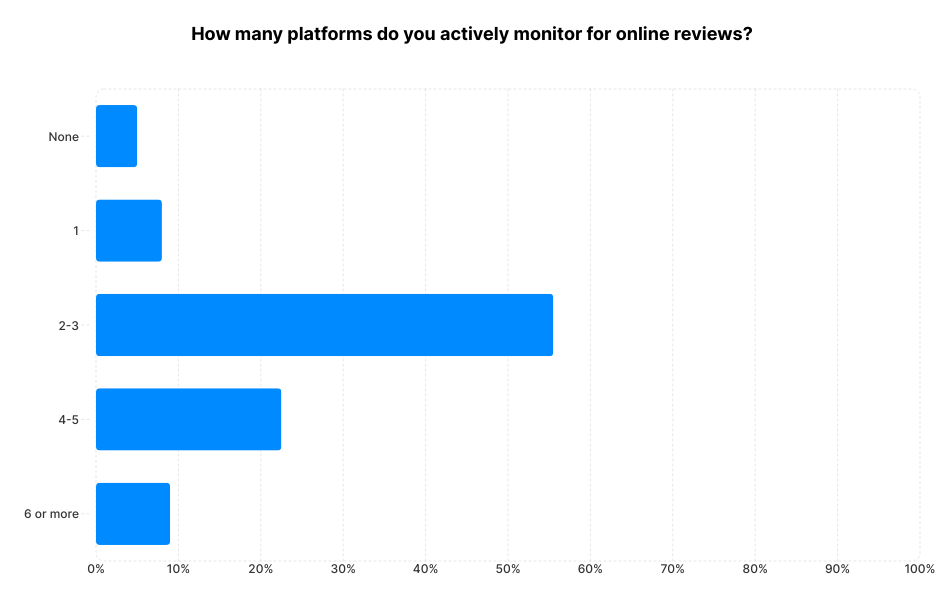
Why it matters
People leave reviews in a variety of different places, including Google, Yelp, Facebook, and industry-specific review sites.
If you only focus on tracking 2-3 platforms, you risk missing out on customer feedback and not getting a complete picture of your online reputation.
There’s also a chance that one or more negative or fake reviews might go unnoticed, which can hurt your business’s credibility in the long run.
Recommendation
In the beginning, you can focus on the platforms that your customers use the most. These will likely be Google, Yelp, and one or two industry-specific platforms (e.g., Healthgrades).
As your business grows, put more effort into review monitoring and expand to tracking at least 4-5 review sites.
You can use a tool like ReviewsOnMyWebsite to track 36+ platforms for reviews of your business. And get notified as soon as you get a new review.
2. The majority of businesses use software to manage reviews
78% of businesses use tools or software to manage online reviews. Only 1 in 5 businesses still manage reviews manually.
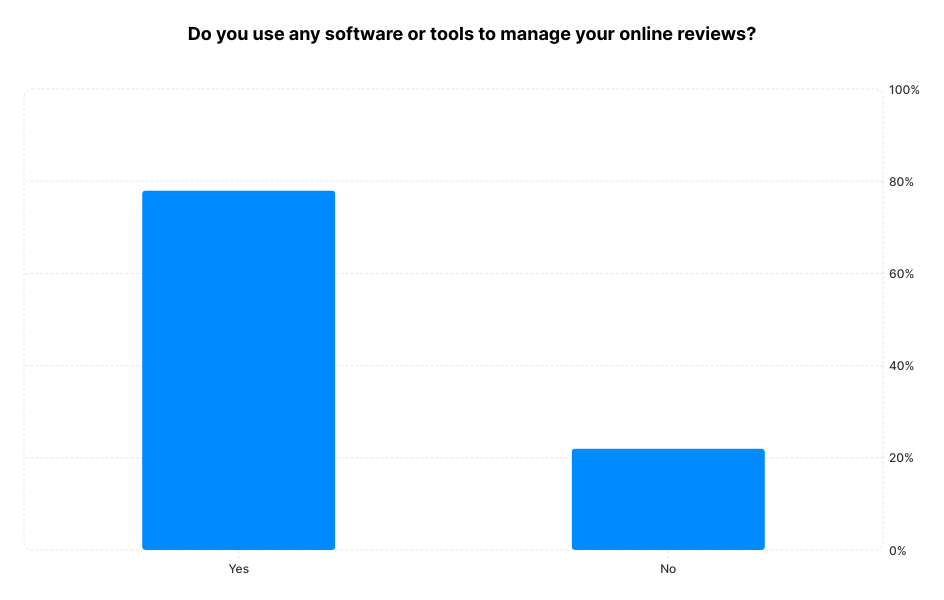
Why it matters
Managing reviews manually is time-consuming and takes away time you could be spending growing your business. It also comes with the risk of delayed responses, which can be especially harmful to your reputation when it comes to negative reviews.
Using software to manage reviews can help you reply faster and allow you to prevent potential reputation crises.
Recommendation
Start using a dedicated review management tool like ReviewsOnMyWebsite to stay on top of your online reputation. It will allow you to track multiple review platforms, reply to all your reviews from one place, and analyze customer sentiment toward your brand.
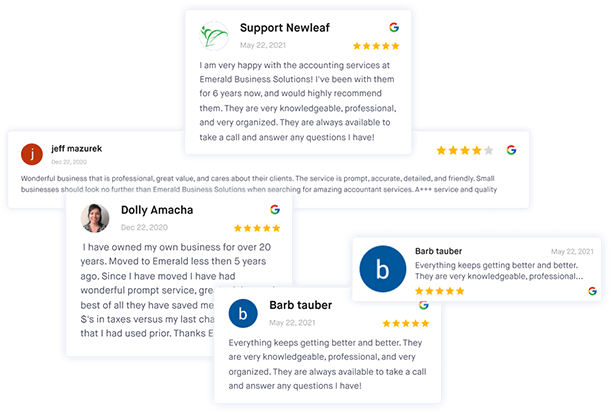
Manage online reviews with ease
Monitor, manage, and get more online reviews for your business with ReviewsOnMyWebsite.
3. Nearly half of businesses check reviews daily
47% of businesses check online reviews every day, and 41% of them look at reviews on a weekly basis.
Only 4% of businesses never check their reviews.
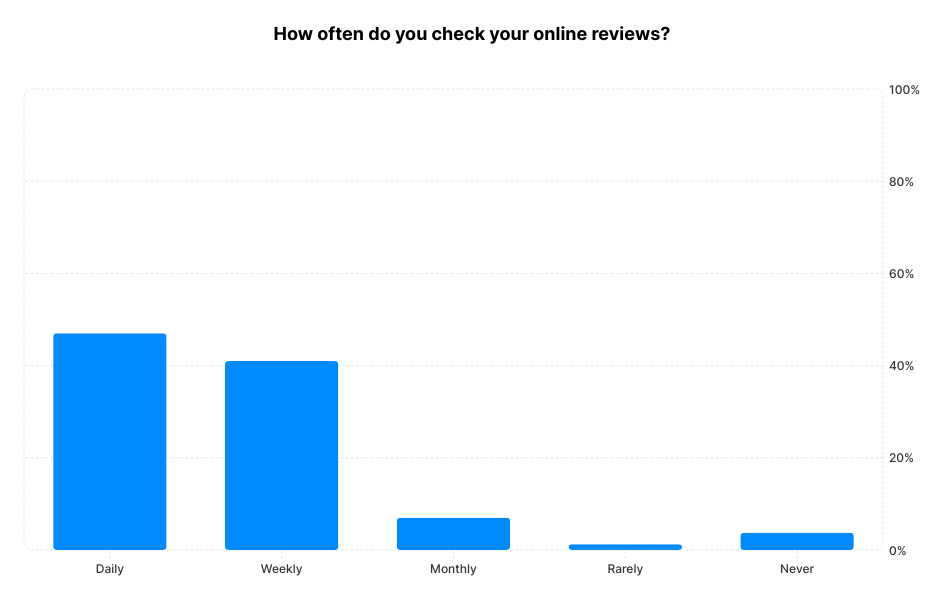
Why it matters
We already know that consumers expect businesses to reply to reviews within 3 days. This makes daily review checks essential for satisfying your customers’ needs and showing that you care about their experience.
It’s also essential for building trust with potential customers, since they’ll be looking at how you treat existing customers when deciding whether to buy from you.
Recommendation
Make it a habit to check your reviews every day, even if you usually don’t get a lot of reviews. You can assign a team member to check reviews daily or use review management software to set up real-time notifications for new reviews.
This will help you address customer feedback as quickly as possible and show your commitment to customer satisfaction.
4. Business owners are usually the ones responsible for review management
For 51% of businesses, the owner is the person who manages reviews. The rest usually have their marketing team or frontline staff take care of reviews.
Only 5% of businesses don’t have anyone responsible for handling reviews.
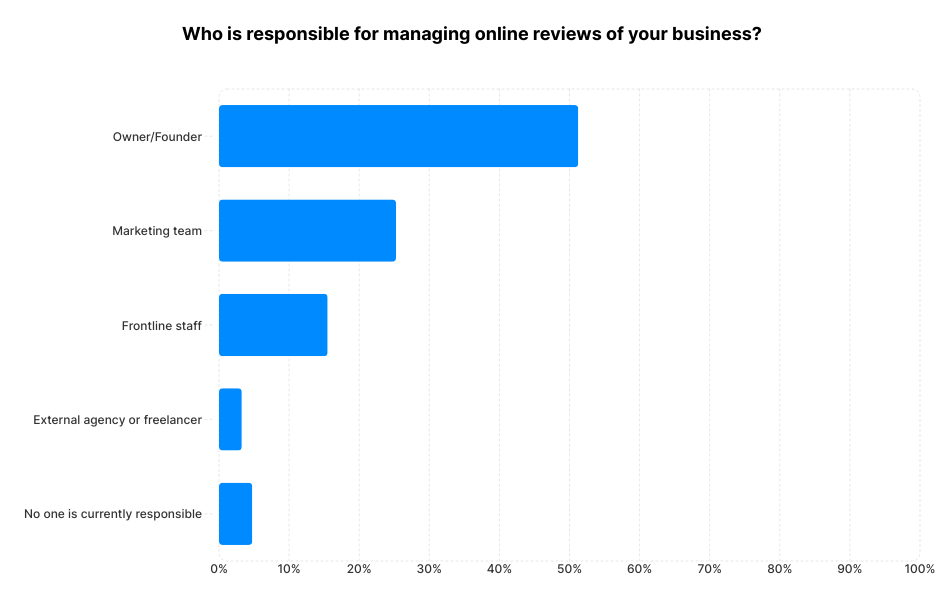
Why it matters
As a business owner, it’s understandable that you might want to reply to reviews yourself and do whatever you can to protect your business’s reputation.
But by doing this, you also create a bottleneck. Managing reviews by yourself can quickly become overwhelming, especially if your business gets multiple reviews every day across different platforms.
And it can result in unanswered reviews or delayed responses, leading to missed opportunities or loss of trust.
Recommendation
If you’re still managing reviews yourself, start involving your team in the process.
Assign one or multiple people to check and respond to reviews on a regular basis. Train them on how to respond to reviews in a professional manner and provide them with guidance on how to handle negative reviews and complaints.
If your team is already stretched too thin, consider outsourcing review management to an agency that specializes in managing online reputation for businesses.
5. Most businesses respond to reviews within 1–2 days
45% of businesses respond to reviews within 1-2 days, while 34% claim to respond within a few hours.
And 4% of businesses never reply to reviews.
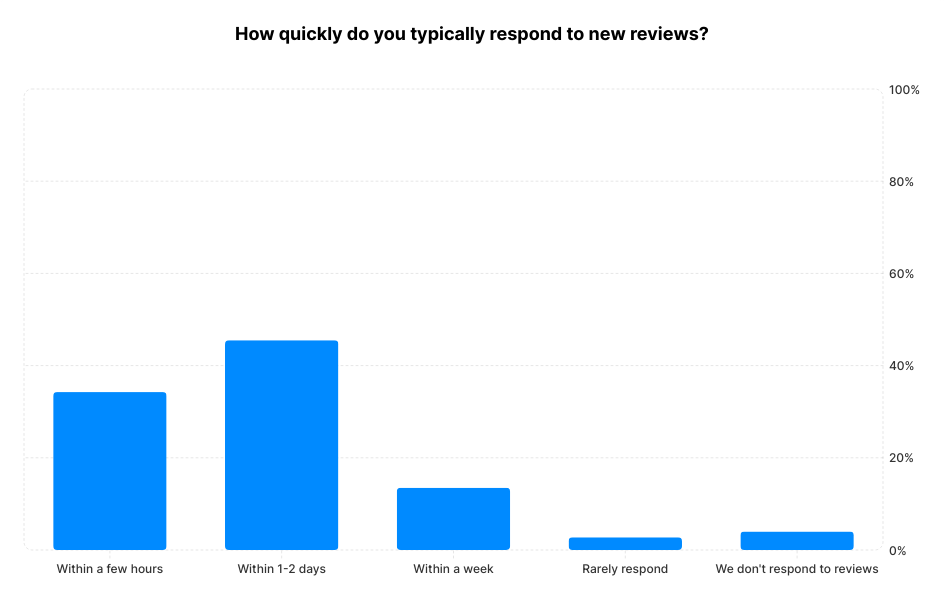
Why it matters
Replying to reviews quickly shows customers that you take their experiences seriously. Providing delayed responses or not responding at all makes you look indifferent.
Striving to respond as quickly as possible not only allows you to resolve any issues faster but also shows potential customers that you’re attentive and trustworthy.
Recommendation
Try to respond to every review within 24 hours. Use templates to speed up replies, but make sure to personalize them for every customer.
You can also use ReviewsOnMyWebsite’s AI-powered response feature to generate personalized replies in seconds.

Manage online reviews with ease
Monitor, manage, and get more online reviews for your business with ReviewsOnMyWebsite.
6. Six in ten businesses actively and consistently ask for reviews
Asking for reviews has become a standard practice for most businesses. 62% of them actively and consistently request reviews from customers. And 27% do it occasionally.
Only one in ten businesses asks for reviews rarely or never.
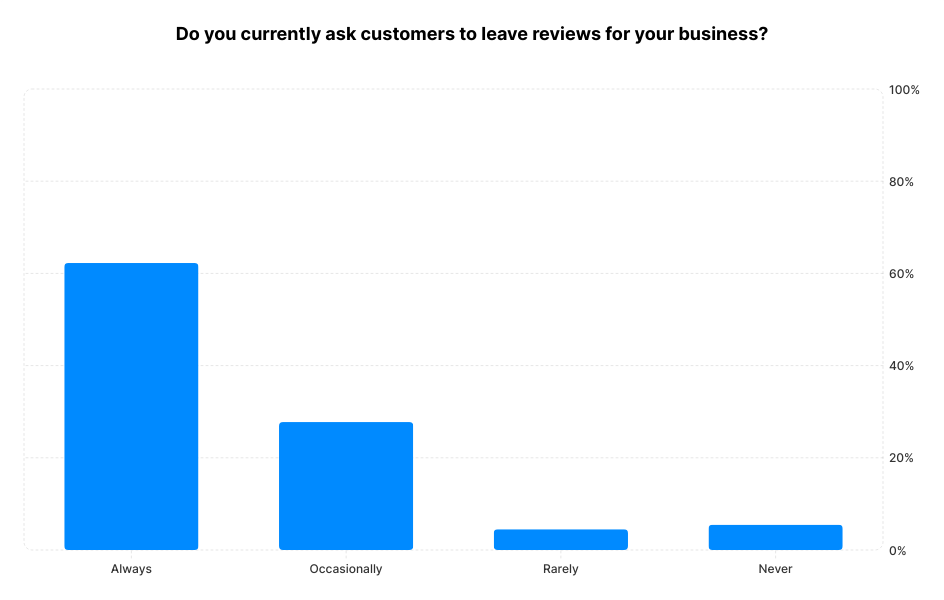
Why it matters
Asking for reviews is one of the best ways to improve your online reputation. If you don’t request reviews on a regular basis, you’ll likely have a relatively low review count.
This, apart from making your business seem less trustworthy, also means that one negative review can considerably damage your online reputation and review rating.
Recommendation
Make review requests a regular part of the customer experience. Train staff members to ask for reviews at the right moment, such as during checkout or after a positive customer experience.
Use a tool like ReviewsOnMyWebsite to implement automated review requests via email and SMS, ensuring every customer gets asked to leave a review.
7. Email is the most common way businesses request reviews
69% of businesses request customer reviews via email. Other popular methods include SMS, printed cards or receipts, and QR codes.
And 23% of businesses use automated software to request reviews.
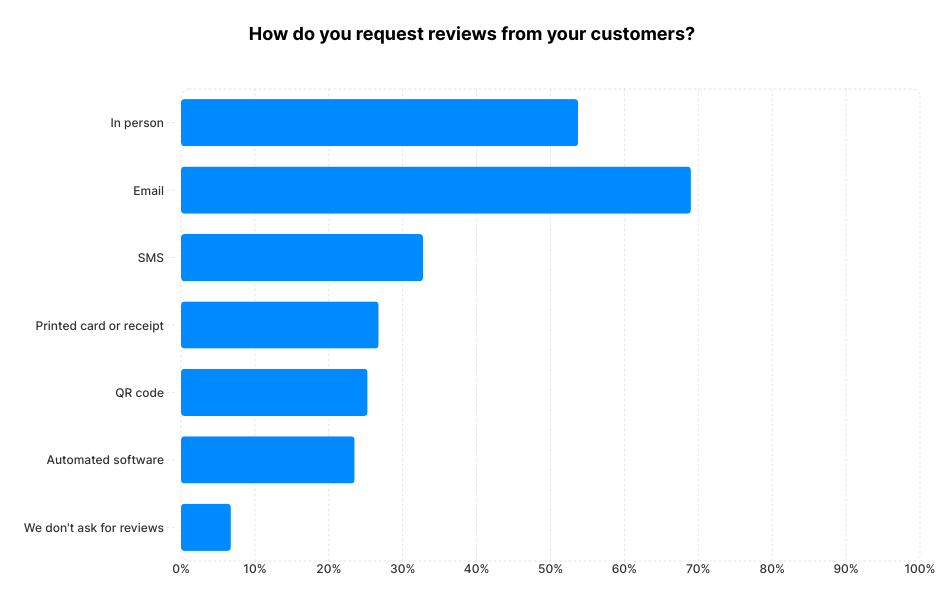
Why it matters
Emails are a convenient and scalable way to request reviews from customers. But if you only use email review requests, you miss out on getting reviews from customers who prefer other communication channels.
Recommendation
If you’re using email to request reviews from customers, keep doing it. But also incorporate other methods.
For example, you can use ReviewsOnMyWebsite to set up automated SMS review requests. Or take advantage of our free QR code generator to create a QR code customers can use to leave reviews for your business.
8. Customers forgetting is the biggest obstacle to getting more reviews
For 52% of businesses, their biggest challenge when it comes to getting more reviews is that customers often forget to do it.
Other common challenges include technical limitations (such as a lack of an email or SMS system) and staff forgetting to ask for a review. Some businesses also cite not asking for reviews because they’re afraid of negative feedback.
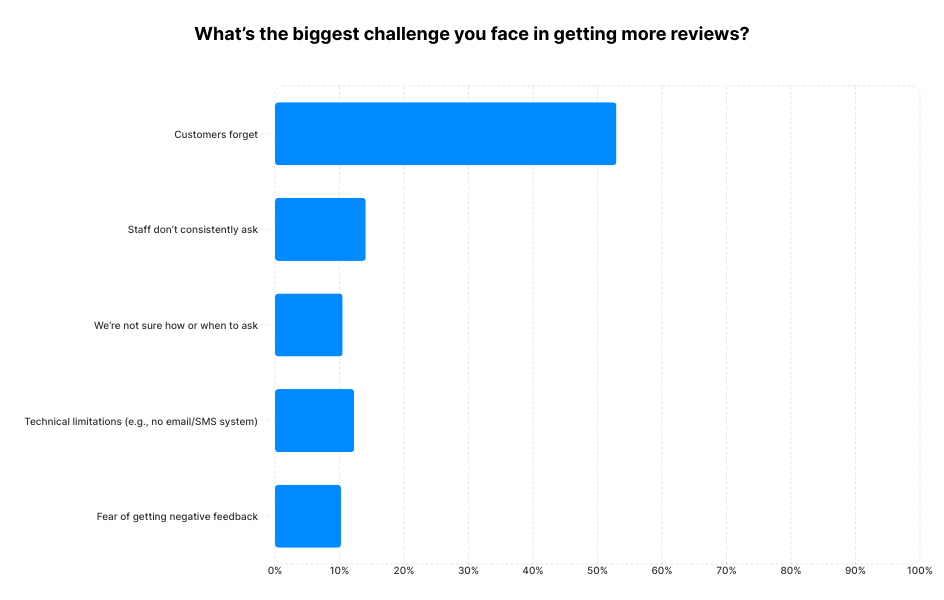
Why it matters
Sometimes, happy customers who are eager to leave a review don’t follow through with it simply because life gets in the way.
If you rely on customers being proactive about leaving reviews, you’ll likely have a hard time building a solid online reputation.
Recommendation
Set up automated email or SMS follow-ups to remind customers to leave a review. This is easy to set up with a tool like ReviewsOnMyWebsite.
9. A third of businesses have dealt with fake reviews at least once
Fake reviews seem to be a common occurrence for most businesses. 62% report receiving a fake review at some point, with 30% receiving multiple fake reviews.
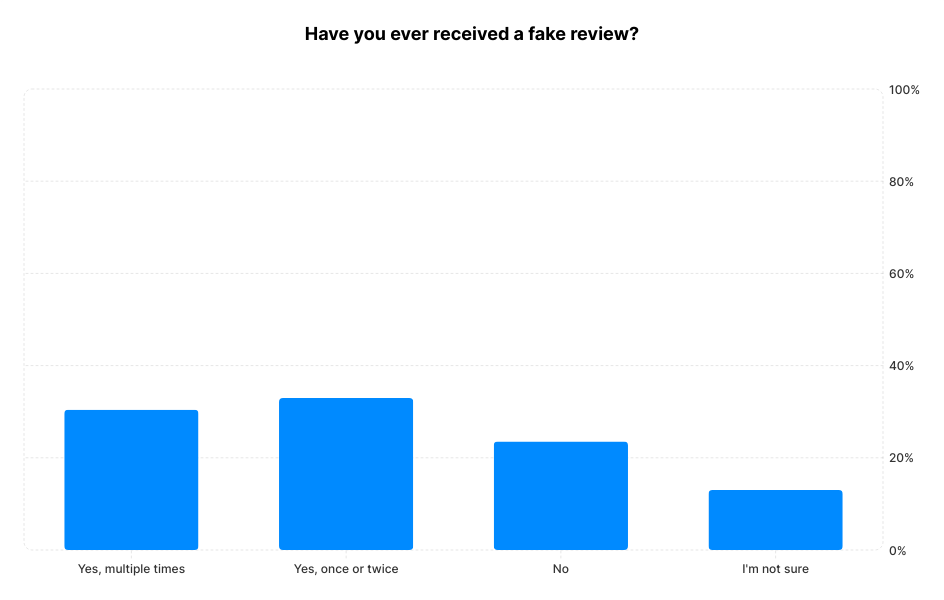
Why it matters
Fake reviews can damage your business’s reputation and make potential customers feel uneasy about buying from you.
Having even one fake review that shows your business in a negative light can impact buying decisions. Especially if your business only has a small number of reviews in total.
Recommendation
Monitor your business’s reviews consistently and deal with fake reviews immediately.
Most review platforms (including Google and Yelp) offer built-in tools for flagging fake reviews. Once you spot a fake review, make sure to report it and request removal.
10. Negative reviews rarely cause direct damage but still raise concerns
While it’s never fun to get a negative review, they usually don’t cause major damage.
Two thirds of businesses state that negative reviews have never had a significant impact on their business. But 19% claim that receiving a negative review resulted in loss of customers or revenue for their business.
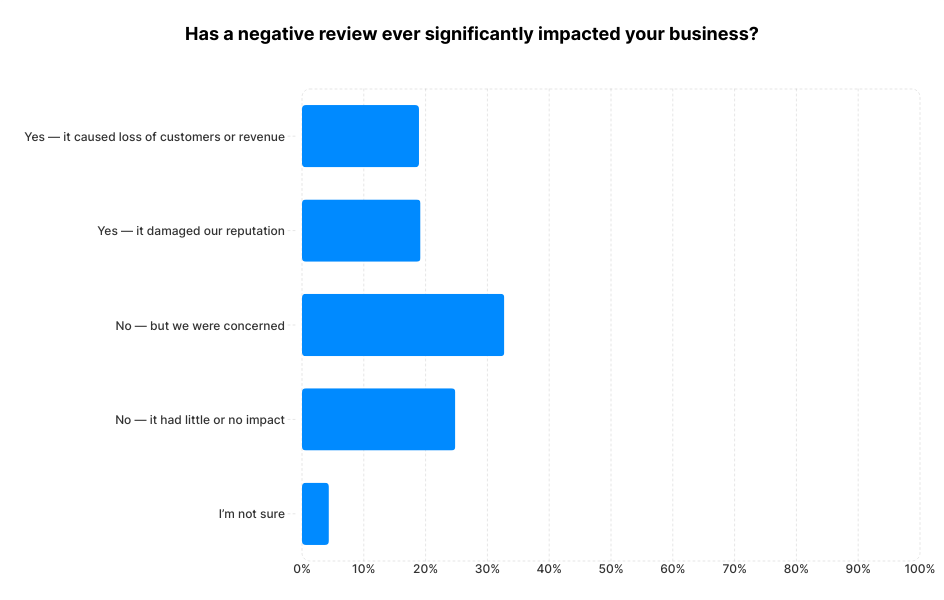
Why it matters
While getting a single negative review probably won’t chase potential customers away, it can still create doubt and show your business in a negative light. And it can also bring down your business’s review rating, making you seem less trustworthy.
Recommendation
Address negative reviews as quickly as possible. Remember to stay professional and apologize. Avoid shifting blame and arguing with the customer.
Ideally, offer to make things right by offering them a refund or a do-over.
This way, you’ll be able to turn a negative review into a positive customer experience.
11. Most businesses only have an informal crisis management plan
37% of businesses have an informal crisis management plan, and 30% have no plan at all.
Only a third of businesses reported having a documented crisis management plan for reputation issues.
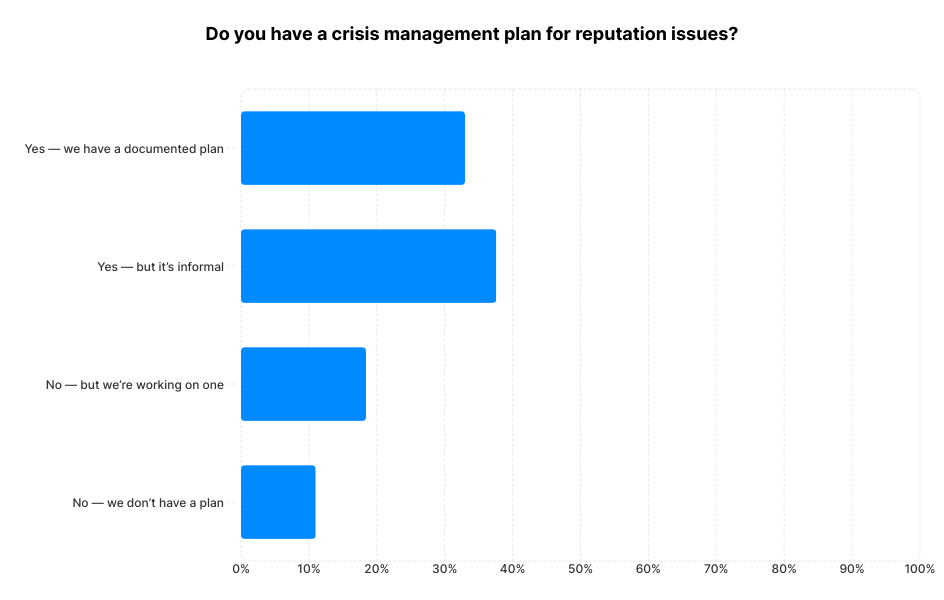
Why it matters
If you don’t have a clear reputation crisis management plan, you risk having a single incident ruin your brand’s hard earned reputation.
Having a plan in place will make your team much more prepared to deal with any crisis that might come up.
Recommendation
Create a documented crisis management plan that defines who’s responsible for handling issues and how to do it. Make sure to include templates and scripts for common scenarios so that your team can act quickly and confidently.
12. The majority of businesses respond to every review
Six out of ten businesses respond to every review (positive and negative ones). And 20% of businesses only respond to negative reviews.
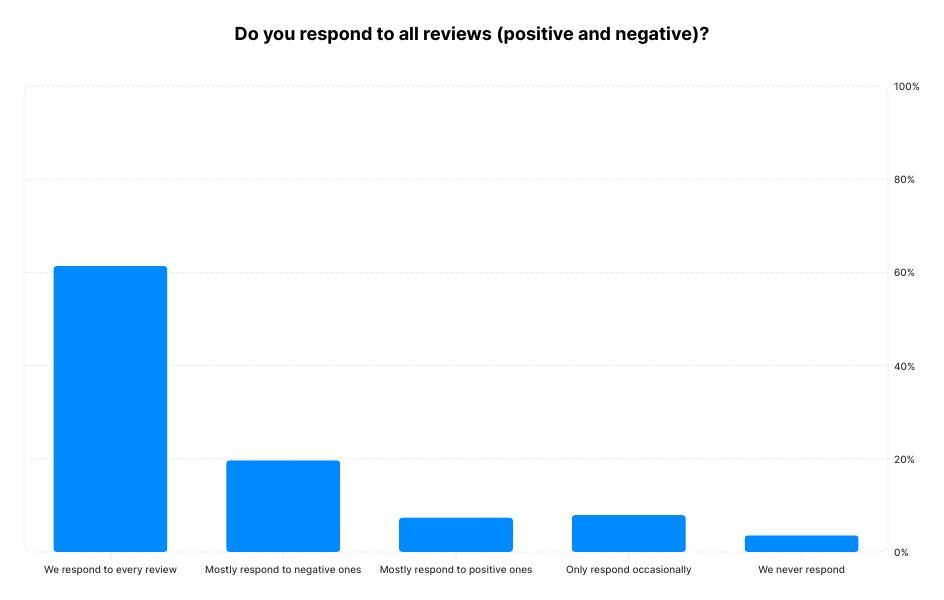
Why it matters
Responding to all reviews your business gets shows customers that you value their feedback and care about their experience. It can also help strengthen customer relationships and build trust.
By ignoring positive reviews, you miss out on the opportunity to reinforce loyalty and encourage repeat business.
Recommendation
Make it a practice to respond to every review your business gets.
For positive reviews, thank customers and invite them to visit your business again. Stay professional and calm when responding to negative reviews.

Manage online reviews with ease
Monitor, manage, and get more online reviews for your business with ReviewsOnMyWebsite.
13. Nearly half of businesses provide formal staff training on reviews
45% of businesses train their staff on how to handle online reviews, and 33% only provide basic guidance.
1 in 5 businesses don’t provide any type of training or guidance when it comes to review management.
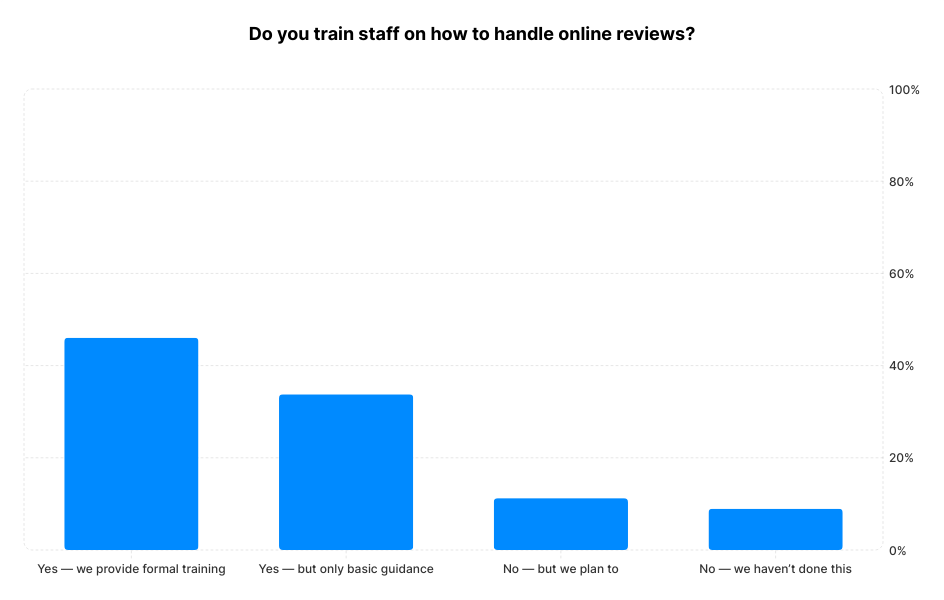
Why it matters
Frontline staff members have the most opportunities to request reviews from customers. If they don’t get formal training on how to do it, they might get fewer responses than ideal or be met with defensiveness from customers.
Recommendation
Develop a clear training program that will teach staff how and when to ask customers for reviews. Provide sample scripts and consider doing role-playing sessions for practice.
This will help improve the consistency of responses and increase the chances of getting more positive reviews.
14. Coordinating across teams and locations is the top reputation management challenge
The biggest challenge businesses face when it comes to managing their online reputation is coordinating across multiple teams and locations. Other key challenges include a lack of budget or time and uncertainty about what to focus on.
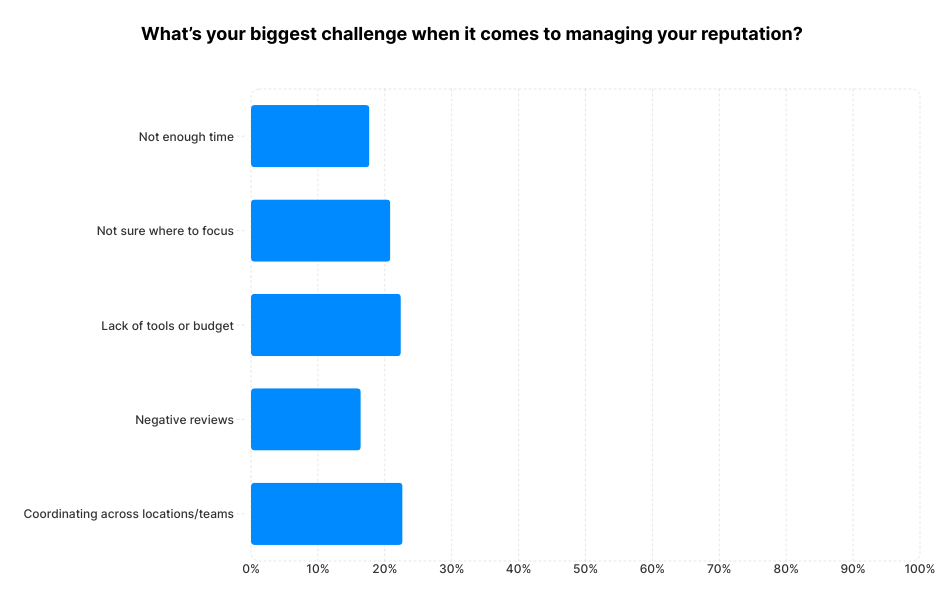
Why it matters
For multi-location businesses and franchises, inconsistency in the way reviews are handled is a big risk.
Different locations might manage reviews differently, creating an inconsistent customer experience. There’s also the risk of a single location’s bad reputation impacting a brand’s global image.
Recommendation
Create a set of reputation management guidelines that should be adhered to across every location. Insist on every location providing review management training to its staff.
Regularly review the performance of every location and make adjustments where needed.
15. Businesses most often measure review success by higher star ratings
36% of businesses measure the success of their review strategy based on whether their review star rating increases or not.
Other popular metrics include the total number of reviews (31%), improved local SEO performance (15%), and more customer inquiries or calls (10%).
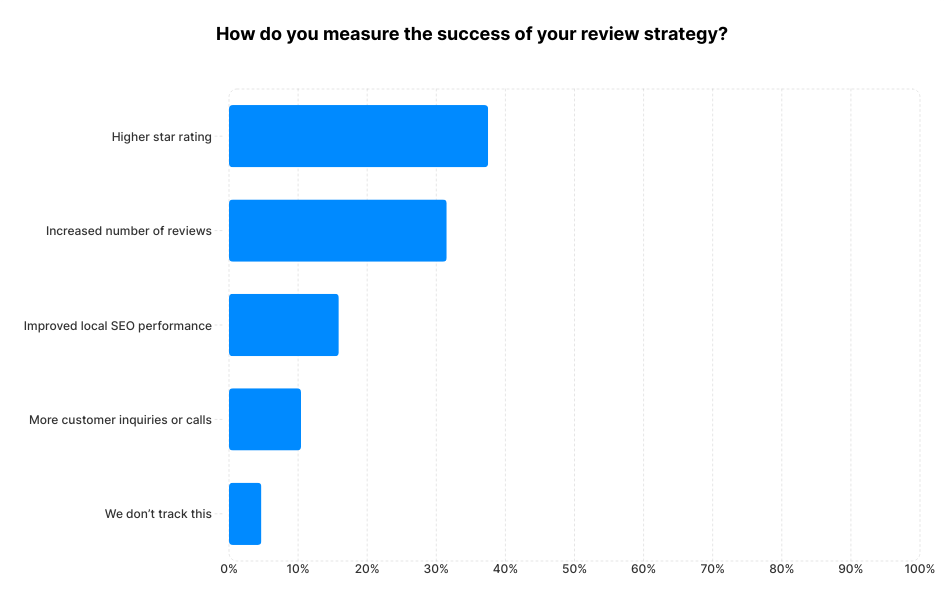
Why it matters
While a lot of potential customers will use your business’s star rating to determine whether to trust it or not, it doesn’t tell the whole story.
If you only focus on ratings, you’ll neglect the other benefits of review management, such as stronger customer relationships, improved search visibility, and valuable feedback.
Recommendation
Track and pay attention to more than just your star rating. Monitor trends in review volume, the ratio of positive to negative reviews, the overall sentiment customers have toward your brand, and the impact of reviews on conversion rates and new business.
This will help you get a better idea of how your online reputation management strategy is performing.
Over to you
While businesses are catching on to the importance of online reputation management, there’s still room for improvement. Especially when it comes to managing reviews across multiple platforms, having a formal crisis management plan, and managing reputation across multiple locations.
Treat your online reputation as one of your business’s most valuable assets. And follow these steps to improve your reputation management strategy:
- Expand your monitoring: Track reviews across at least 4-5 platforms to reduce blind spots.
- Adopt the right tools: Take advantage of review management software to streamline review responses and generate reviews on autopilot.
- Respond quickly and consistently: Reply to both positive and negative reviews and strive to do so within 24 hours.
- Train your team: Provide review management training to team members to ensure they’re equipped with the skills needed to effectively collect and manage customer feedback.
- Prepare for crises: Create a formal crisis management plan in case of incidents.
- Measure broadly: Track review volume, star rating, customer inquiries, and search engine visibility to determine the success of your review strategy.


